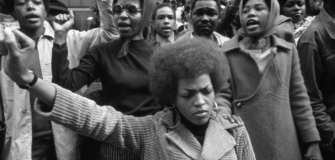A Conversation with Jenny Lewis
Share
Upspoken had the privilege of talking to Jenny Rebecca Lewis, a teacher and life coach in Venice, CA, who is prepping for the launch of her podcast Sex, Race and Money which focuses on each topic as pathways to personal empowerment and soul-healing. You can watch the first episode here. As a teacher and life coach, Jenny offers coaching one-on-one and group sessions which includes a 12-step work to help identify release, and open to new ways of being. Jenny took the time to discuss her journey with contracting an STI, learning to love herself, and healing through her experience.
Can you share your story with our readers?
I was dating a guy for about 10 years. Our relationship was good and I felt this would be the man I would marry. He was the person who did all the family things with me. He was a very good friend and very supportive of me. I felt I needed to move the relationship all the way through to marriage in order to check the boxes and secure our relationship and be seen as a more successful person. I wanted to fit in and be more like the other couples that I saw around me because we put a lot of work into this relationship. Suddenly, I noticed a sore on my genitals and ended up having herpes. He’d come from a deeply religious background and I knew that would be a deep issue for him, and I didn’t know what to do. He was a person that I really wanted to spend my life with. I felt telling him would ruin all of that, and I would no longer be good enough for him to marry or continue to date and really it was about me not feeling good enough and unworthy because I was 38. With my fertility waning, having a desperate grip on wanting the relationship to end in a particular way, and thinking about the way that my parents, family, and friends would react made me feel like I couldn’t spoil it with this disease.
Do you recall how you contracted herpes and how you confronted your partner?
I hoped that it wasn’t true because I hadn’t slept with anyone else…And because of his religious background, I had more partners than him. So, I went straight to blaming myself. I don’t know how it happened, but it happened. I felt I had a responsibility to tell him, but didn’t know how, and eventually, the infection was just undeniable and we had to talk. I took the blame and the relationship really went into a deep depression and sadness. We felt condemned to a place of unlovability.
How did the end of your relationship and diagnosis change your perspective and behavior?
I was left feeling worthless, not knowing who I was and if I was going to live this normal life of getting married and having kids. The only way I could find the courage to go out was to drink because I was sad and hurt by the situation and it was the only way that I could come out of the shell of shame and unworthiness that I felt. I met a person during that time, much younger than me, and there was a spark of hope, lovingness, and freedom, that I hadn’t had in that first relationship and a deep physical attraction that was instantaneous.
Did you think about how you would tell your new partner about your diagnosis and how that would affect your relationship with him?
I felt I couldn’t tell him about herpes, although I deeply wanted to, every time the idea came up I couldn’t put it into words. Instead of telling him, I ended up drinking a lot and having sex with him on the first date. By doing so I felt I had betrayed him and because my attraction to him was so powerful and undeniable, I continued to sleep with him. The only thing I had the power to do is just really take a lot of the prophylactic medicine, always use condoms, not see him often, and not really be engaged in the sex as deeply as I wanted to be.
What did you learn from not disclosing your status to your new partner?
There was this deep feeling of unworthiness and guilt because I wasn’t being honest and it showed up in my body. I didn’t have outbreaks, but I often had yeast infections and bacterial infections. The infections would stop us from having sex because I’d have to treat them and I knew it was the result of not being honest and true. I felt if I was honest and true; he would find me unworthy and I would just end up being alone again. The relationship went on for maybe a year and we ended up having sex without a condom and I realized I couldn’t continue this way.
When did you get the courage to tell him about your diagnosis?
I woke up in the middle of the night and I watched this movie. In the movie, there was a person with a very similar situation and it inspired me to write this long email. I put everything in the email that I wanted to say. I couldn’t hold the secret and as many times as I tried to I couldn’t find my voice. I had to communicate somehow even though I knew through email was less than ideal. When I hit send on that email, I felt so much power released in my body, my throat was throbbing, and a feeling of terror just took over me because I had shown myself to the world in a way that I had been afraid to for so many years. I felt like the police were gonna come and get me at any time. I’m an attorney and I knew the repercussions of admitting to something in writing. I just have to say even in that moment of terror and fear, there was so much release and happiness in being in the truth of who I am.
What has your healing process been and what is your self-care routine now?
What I’ve learned is that STDs are the least of who I am. I think there’s just so much love, generosity, and willingness to be in this life and I almost lost that to a disease that someone told me mattered. That’s where the real power comes in this journey; finding who I am and standing in that no matter what. It’s been a lot about finding what’s really true for me. My own process is a 12-step program. For instance, I have a belief that I’m unworthy because I have herpes and I’ll do 12 steps on that idea. I do that in order to get to the meat of what it is I’m taking on. I do the work, which can take days or weeks to get through, with the help of a sponsor.
Do you feel stigmatized? And what was the journey around challenging the notion that we can’t talk about these things?
The gift of herpes is that it’s a long journey and it’s a constant unfolding of new realizations. At the very beginning of the first relationship where I contracted it, I felt deeply stigmatized. The stigmatization was me buying into the collective consciousness culture, believing that I was unworthy because I had an STD. Once I detached myself from that collective belief, my relationship with the stigma changed. I am only stigmatized to the extent that I align myself with that belief. Once I did the work to see that’s not true, the stigma lessens and dissipates. It’s a practice and it’s taken me years to get there.
And how do you approach telling a partner about an STI now?
It depends. I feel out the situation and it’s always important to tell them in a way they can receive. I’m able to have a conversation and put enough space in between the actual act of having sex. It’s important that I’m consciously aware of where they’re at, the timing, and the wording needed in order for them to hear what I have to say and answer their questions about what the STI is means for them. I say we’re going to have a conversation, I want to know about relationships and STIs.
What other conversations should we be having with our sexual partners?
It’s easy to get caught up in the attraction of sex. So it’s, Are you single and available to make this connection with me exactly as I am in all the things that I bring to you? Who are you and who are you bringing in? What are your connections? Are you gonna meet me here? Setting the groundwork for deep connection is really what sexuality and the erotic world is meant to be.
What would you want Upspoken readers to know about prioritizing their wellness and their sexual health?
I think sexual health is something that is really important to be prioritized because it’s a deeply innate part of what it means to be human. It’s not a side note. It’s not a one-off. It’s as deep and true as eating and breathing. The primal urge within you is real and something to be honored, and the self-care and the care for yourself that’s needed in order to meet in an honorable way is important.
Are there any words of encouragement you can give people who are in a phase of not loving themselves and not being able to be honest with themselves?
In the depths of despair, there is truth and lovingness beyond anything that we have known.




Follow Us